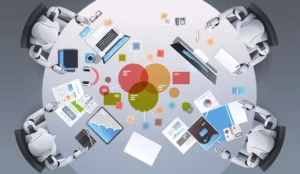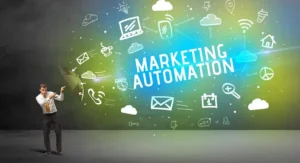Home / Blog


Discover How Automation Can Supercharge Your Marketing Efforts. Improve Efficiency, Save Time, and Ensure Productivity. Learn All the Tips from the Very Best Digital Marketing Company in Kolkata
Marketers are always looking for ways to optimize their processes and do more in today’s fast-paced digital environment. Automation has emerged as a powerful tool, providing numerous solutions that enable brands to achieve efficiency, consistency, and measurable results. But how exactly can automation impact marketing, and which areas can benefit the most from automation?

The demand for personalized and targeted communication is growing exponentially. Tailoring campaigns for large audiences takes significant time and effort. This is where automation shines — by automating repetitive tasks, creating personalized experiences, and freeing up marketing teams to focus on strategy.
Automation can be applied across various aspects of marketing, from email marketing to analytics. Here are a few key areas where automation can have a significant impact:
Email remains one of the most powerful digital marketing channels. However, sending personalized emails to different segments manually can become labor-intensive. With automation, you can set up workflows that automatically send the right messages to the right people at the right time.
Series welcome emails, abandoned cart reminders, and birthday emails can all be automated to save time and increase engagement.
Posting frequently across multiple social media platforms requires a lot of time and planning. Automation tools make it easier to plan posts in advance, track engagement, and manage multiple accounts from one dashboard. Tools like Hootsuite and Buffer can schedule posts, ensuring that your brand stays visible and active online.
Leads don’t always convert right away. Automation helps by scoring leads based on their actions on your website, so you know which leads are most likely to convert. Additionally, automated lead nurturing sends follow-up emails and relevant resources to guide leads through the buying process.
Personalized content leads to higher engagement. Automation tools help marketers personalize content based on customer interests, buying history, or browsing behavior. By using data-driven insights, brands can share product recommendations or content tailored to each customer’s unique needs.
Manually tracking and analyzing metrics is time-consuming and prone to errors. Automation tools simplify this process by collecting and organizing data, providing real-time analytics that help you make quick, informed decisions. This is crucial for optimizing ongoing campaigns.

Introducing automation into your marketing strategy should be done thoughtfully. Here’s a simple step-by-step approach to get started:
Before implementing automation, it’s crucial to define what you hope to achieve. Whether your goal is to increase engagement, convert more leads, or retain existing customers, knowing your target will help you determine how best to use automation.
Select automation tools that align with your goals and fit within your budget. Different platforms offer various features, so it’s important to do your research. Popular options include HubSpot for CRM, Mailchimp for email automation, and Buffer for social media scheduling.
Audience segmentation is key to ensuring your automation efforts are effective. By grouping your audience based on demographics, behavior, or their position in the buying cycle, automation can deliver more relevant messages to the right people at the right time.
Triggers are events that activate specific workflows. For example, a welcome email might be triggered when someone subscribes to your newsletter. You can define triggers based on customer actions and set up workflows that ensure a seamless journey from awareness to conversion.
Automation isn’t a “set it and forget it” solution. Regular monitoring and optimization are necessary to keep campaigns effective. Use data and analytics to review performance and make adjustments as needed to improve results.

There are numerous advantages to using automation in marketing. Here are some of the key benefits:
Automation reduces the time spent on repetitive tasks, freeing up resources for more creative and strategic work.
Automation ensures that your messages and brand voice remain consistent across all platforms, helping to build trust and recognition.
Automation allows for highly personalized communication, which can lead to increased customer satisfaction and loyalty.
Automated campaigns typically result in higher engagement and conversion rates, which translates to a higher return on investment (ROI).

A1: Automation levels the playing field for small businesses, allowing them to compete with larger brands. It helps small businesses reach a wider audience with fewer resources, streamlining tasks such as social media management, email marketing, and lead generation.
A2: The best automation tool depends on your specific needs. Popular platforms include HubSpot (CRM and marketing automation), Mailchimp (email automation), Buffer (social media scheduling), and Salesforce (CRM and lead management).
A3: Yes, when done properly, automation can strengthen customer relationships by delivering relevant content at the right time, improving the overall customer experience.
A4: Automated workflows should be reviewed at least quarterly to ensure they remain effective and aligned with changes in market trends and customer preferences.
As digital marketing continues to evolve, the role of automation in improving efficiency becomes even more significant. By incorporating automation tools into your strategy, brands can save time, increase engagement, and drive a higher return on investment. Partnering with the best digital marketing company in Kolkata, can help streamline your automation efforts by ensuring you’re using the right tools and strategies to maximize results. When implemented thoughtfully, marketing automation can deliver sustainable growth and provide a competitive edge in today’s fast-paced digital landscape.